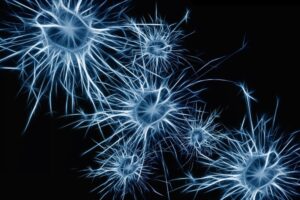
Restoring electronic signals in a specific region of the brain may be an effective way to treat depression, new research shows.
The study was performed by scientists at New York University’s Grossman School of Medicine and the University of Szeged, Hungary. They found that altering the timing and strength of gamma waves in the olfactory bulb can impact emotions.
The olfactory bulb is located next to the nasal cavity. It is a part of the brain known to process smells. It is also thought to transmit brain-wave gamma oscillations.
Gamma in the brain, as opposed to gamma rays, is a rhythmic synchronization of neurons in the brain to process information.
Researchers blocked the olfactory bulb in rodents. As a result, they observed depression-like behaviors among the mice and rats. However, when they restored the gamma signals to the brain – the rodents returned to normal.
Economic Drain
Major depression disorder (MDD) cost the United States economy $326 billion in 2018. That was the result of a 30-year joint study by economic research firm Analysis Group and Harvard University.
The report published in the May 2021 edition of PharmacoEconomics was the final installment of four reports during the study period.
The $326 billion figure was a 38 percent increase over the figure report in the 2010 installment of the report. In addition, the report noted that costs included more than treatment.
“It is striking that the societal costs of depression increased even as the average direct costs per sufferer declined,” said Paul Greenberg, a managing principal with Analysis Group said at the time. “For every dollar spent on direct costs of illness for medical expenses such as antidepressant prescriptions and doctor appointments, an additional $2.30 went to indirect costs, including lost productivity at work, and another $5.61 went to various direct and indirect comorbidity costs. Spending more on successfully treating those with depression would likely reduce the overall burden.”
What is Depression
There are several kinds of depression. The most common include MDD and persistent depressive disorder. In addition, women may experience postpartum depression following childbirth.
Major depression is a constant state of sadness. Whereas persistent depressive disorder fluctuates between mild and major symptoms.
Women are twice as likely as males to experience depression, according to the Centers for Disease Control (CDC).
Treatment of Depression
The two main treatments for depression are psychotherapy and medications. However, the effectiveness of both vary. In addition, antidepressants can produce side effects. As a result, scientists taking part in the gamma study hope their research will produce an additional treatment option.
“This work demonstrates the power of gamma-enhancement as a potential approach for countering depression and anxiety in cases where available medications are not effective,” said Antal Berenyi, MD, Ph.D,, one of the study authors.
Read More:
Come back to what you love! Dollardig.com is the most reliable cash-back site on the web. Just sign up, click, shop, and get full cashback!